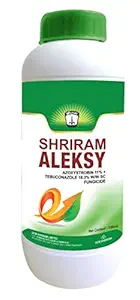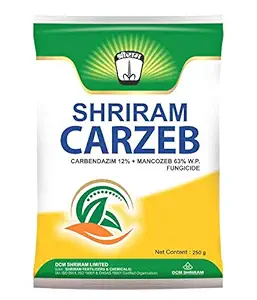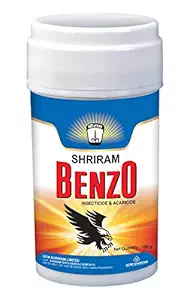Crop Protection By DCM Shriram
by DCM Shriram
Price: 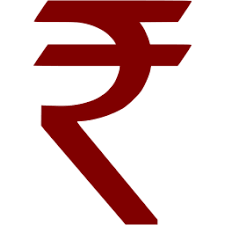 0
0
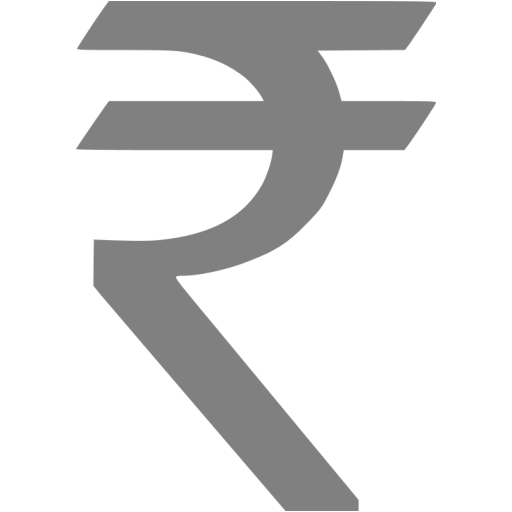 0
0
 0
0
 0
0
You Save:  0
0
 0
0
by DCM Shriram
Price:  560
560
 1310
1310
 560
560
 1310
1310
You Save:  -30%
-30%
 -30%
-30%
by DCM Shriram
Price:  0
0
 0
0
 0
0
 0
0
You Save:  0
0
 0
0
Shriram Aleksy (100 ml Pack) - for fungal Diseases of Rice(Paddy), Chilli, Apple, Onion, Potato and Many Other Crops - Fungicide - Pesticide - Product Features
- Shriram Aleksy containsAzoxystrobin 11% + Tebuconazole 18.3% SC which is a broad spectrum fungicide for the control of many fungal pathogens & diseases recommended at the rate of 240-300 ml per acre or 1 ml / L water for major crops both as protective as well as curative control
- Shriram Aleksy has translaminar and strong systemic mode of action with acropetal movement. Azoxystrobin inhibit mitochondrial respiration blocking the cytochrome BC1 complex and Tebuconazole inhibits sterol production at different sites which effects cell membrane structure and function
- Recommended to be used on crops like Rice for control of Sheath Blight, Chilli for control of Fruit rot, Powdery mildew, Die back, Onion for control of Purple blotch, Apple for control of Scab, powdery mildew & premature leaf fall, Wheat for control of Yellow Rust, Tomato for control of Early Blight, Potato for Control of early and late blight and Grapes for control of Downy Mildew and Powdery Mildew
- Shriram Aleksy impacts positively on the physiological activity of the applied crop by improving the yield & quality of the produce thus fetching better price
- Shriram Aleksy should be applied preventive and to be repeated at 15 days interval depending upon prevailing weather conditions and disease pressure. It also has curative properties.
Shriram Veeru (250 g Pack) - for Control of Sucking pest Complex in Multiple Crops Like Cotton and Vegetables - Insecticide - Pesticides - Product Features
- Shriram Veeru contains Diafenthiuron 50% WP which acts as an insecticide and acaricide by contact and stomach action. It can be used at the rate of 240-320 gm / acre in 200 L of water
- It is a pro-insecticide, which has first to be converted to its active form. The active compound then acts on a specific part of the energy-producing enzymes in the mitochondria. This results in immediate paralysis of the pest after intake or contact with the product.
- Shriram Veeru is broad spectrum insecticide which is recommended for use in Cotton for control of White Fly, Thrips, Jassids & aphids; Cabbage for control of Diamond Back Moth; Brinjal for control of White fly; Chilli for control of Mites; Cardomom for control of Thrips, Capsule borer; Citrus for control of Mites
- Shriram Veeru has translaminar action, which allows control of hidden pests in plant canopy & has vapour action and works well in dense crops and in large fields.
- Shriram Veeru is safe to beneficial insects & suitable for Integrated Pest Management (IPM) programme.
Shriram Carzeb (250 g Pack) - Fungicide for Multiple Diseases in Various Fruits Vegetables and Field Crops - Pesticides - Product Features
- Shriram Carzeb contains Carbendazim 12% + Mancozeb 63% WP which is a broad spectrum systemic and contact fungicide with protective and curative action used as foliar spray to control a wide range of fungal diseases in various crops. it can be applied at the rate of 80-120 gm/acre
- It works by inhibiting the development of fungi probably by interfering with spindle formation at mitosis (cell division)
- Shriram Carzeb is recommend to be used on various crops like Groundnut for control of Leaf Spot; Potato for control of Early & Late Blight, black scruff; Maize for control of Downy Mildew & Leaf Blight; Rice for control of Blast
- Also recommended on Tea for control of Blister blight , grey blight , red rust , die-back , black rot; Grape for control of Downey mildew, powdery mildew, anthracnose; Mango for control of Powdery mildew and anthracnose; Chilli for control of Leaf Spot, Fruit rot, and Powdery mildew; Apple for control of Fruit scab & Powdery mildew; Groundnut (seed treatment) for control of Tikka leaf spot, Collar rot and dry, root rot.
- Shriram Carzeb can be used as protective and curative fungicide. It is sprayed at the time of appearance of disease symptoms. Shriram Carzeb contains a systemic fungicide carbendazim and a contact fungicide mancozeb and ensures double protection from inside and from outside.
Shriram Benzo (100 g Pack) - for Control of for Boll Worms, Caterpillars, Borers and Fall Army Worms in Various Vegetables, Corn and Cotton Crop - Insecticide - Pesticide - Product Features
- Shriram Benzo contains Emamectin Benzoate 5% SG which is a Broad-spectrum Insecticide for control of various insects like borers & boll worms and is recommended at the rate of 50-100 gm/ acre or 10 gm/ 10-15 Litre Water
- Shriram Benzo is most effective when ingested by larvae. The affected larva gets paralysed, stops feeding shortly thereafter and and is killed within 2-4 days.
- Shriram Benzo is recommended to be used in various crops like Cotton for control of Boll worms, Okra (Bhindi)for control of Fruit & Shoot Borer, Cabbage for control of Diamond back moth, Chilli for control of Fruit borer, Thrips, Mites, Brinjal for control of Fruit and Shoot borer, Red Gram ( Arhar/ Tuar) and ChickPea for control of Pod Borer, Grapes for control of Thrips and Tea for control of Tea Looper
- Shriram Benzo is applied when the initial incidence of Larvae (1st instar) is first observed and repeat applications as necessary. It i s also recommended for use on Fall Army worm of Maize (Corn) Crop
- Shriram Benzo is non-systemic insecticide which penetrates leaf tissues by trans-laminar movement. It has contact and stomach action which gives effective control of the pests. Proper coverage of the plant surface is important to get effective control. Spray volume of 200L per acre is recommended.
To ensure that as many farmers as possible are able to access the benefits, the Kisan Store has five Indian languages including Hindi, Telugu, Kannada, Tamil, and Malayalam. Farmers who prefer to shop offline at a neighbourhood store can also benefit from the range of choice and conveniences of Amazon’s Kisan Store. They can visit any one of the 50,000+ Amazon Easy stores across the country where the store owner will help them browse the selection, identify a product, create an Amazon account and place orders. Farmers can choose from a selection of thousands of farming equipments from over 20+ brands. This selection is offered by hundreds of Small and Medium Businesses present across the country.
Inaugurating the store, Shri Narendra Singh Tomar, Hon'ble Minister of Agriculture & Farmers Welfare, said, Addressing at the launch event, Shri Narendra Singh Tomar, Hon'ble Minister of Agriculture & Farmers Welfare said, “It gives me immense pleasure to launch Amazon Kisan Store. I hope this initiative proves to be beneficial for the farmers and the people associated with the farming community to engage the Indian farmers in the modern era of digital economy, increase the productivity of agricultural produce, provide services like logistics industry.
Many D2C brands across the country have surpassed the Rs100-crore benchmark in revenue. According to the Shiprocket-CII-Praxis report, grocery, gourmet, apparel and footwear and personal care are the largest D2C categories, together capturing more than 75% of the D2C market
Shiprocket, India's largest eCommerce enablement platform, has released a report on the D2C market in India in partnership with CII (Confederation of Indian Industries) and Praxis Global Alliance, a global management consulting and consulting firm.
According to the report, Direct to Customer (D2C) is a $12 billion market and is witnessing remarkable and rapid growth. The report states that several D2C brands in India have surpassed Rs 100Cr revenue in 3-5 years after launch.
The latest report shows that D2C brands represent an estimated $60 billion industry in FY27, at a CAGR of approximately 40%. The numbers in the report are staggering and pave the way for a new model of e-commerce in which brands choose to own and operate their own sales counters on the Internet. This remarkable trend has been reaffirmed by the fact that many D2C brands across the country have surpassed the INR 100-crore benchmark in revenue. Moreover, this revenue benchmark was only reached in 3-5 years since the start of the activities.
These trends are supported by the brands' agility and Go-To-Market (GTM) strategy, as well as strong digital capabilities that have helped their businesses grow and gain a competitive advantage. The report shows that branded packaging has also been a key factor in attracting buyers. The average order value (AOV) of each product and a hefty gain in gross margins are the fundamental headwinds driving this trend further.
Speaking about the report's launch, Saahil Goel, co-founder and CEO of Shiprocket said: "The rise of online-first shopping and conscious consumerism have fueled the era of direct-to-consumer (D2C) brands limited to marketing alone. of their products through online marketplaces or offline channels, quite a few brands are developing their own eCommerce stores or apps for the purpose of capturing orders and delivering them directly to the customers using eCommerce enablers. direct selling, this trend is continuing to newer heights.The rationale for direct selling is the same online as offline.Brands create their own branded stores and also sell in department stores or multi-brand outlets if they can control the brand experience in their own stores. Likewise, direct-to-consumer online channels empower brands to control the story and brand experience."
He added: "With this report, our aim is to provide the first-ever comprehensive deep dive of the D2C sector in India and its huge potential in the coming years."
Commenting on the launch, Praxis Global Alliance partner Mohit Mittal said: "The Indian e-commerce market is growing rapidly (estimated CAGR of 25% from FY22 to FY27). We have seen that almost all PINs in India use e-mail. commerce.Many of these transactions and orders come from second and smaller cities.By FY30, India will also have 1.3 billion+ smartphone users and 500 million+ online shoppers.The growing e-commerce sector is positively impacting D2C growth brands in India.With more people shopping online and more money being spent by consumers, the market is likely to expand in the next five years.To reduce their reliance on the marketplaces, even traditional brands are increasingly developing their direct-to-customer channels, such as tools for websites, apps and social media to reach and sell their customers."
To estimate the size of the D2C market in India, we considered seven categories: Personal Care, Apparel & Footwear, Groceries & Refined Foods, Jewelry, Electronics, Healthcare, Home Furnishings, Garden & Outdoor. Existing players (such as Unilever, Marico, Tata Consumer Products and ITC) are either acquiring prominent D2C brands or going the organic route to launch their own brands online and build their own D2C platforms. But for D2C brands to sustain this growth, they must amplify product innovation and renew manufacturing and sourcing strategies to become industry leaders. So to win the market, it is also essential to improve offline distribution, customer acquisition and unit economy.
Popular Categories on BuyBestBrands.in
Garden & Outdoors : Seeds, Plants, Plant Containers, Gardening Tools, Garden Decor, Pest Control, Barbecue & Outdoor Dining, Solar Power, Fertilizer & soil, Watering Equipment
Amazon Brand : Symbol, Inkast Denim Co, House & Shields, Jam & Honey, Solimo, Presto!, Symactive, Eden & Ivy, Vedaka, Tavasya, Myx

